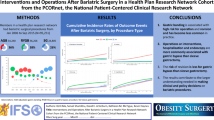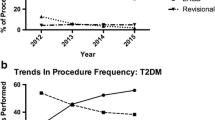Abstract
Objective
Data are sparse regarding the survival benefit of bariatric surgery on mortality among persons with diabetes. We aimed to investigate the association of bariatric surgery, compared with usual care, on all-cause mortality in individuals who underwent surgery and matched controls, stratified by the presence of diabetes.
Research Design and Methods
This retrospective cohort study utilized population-based electronic medical record data. Individuals who underwent one of three types of bariatric surgery during 2005–2014 were included. For each surgical patient, three non-surgical individuals were matched according to age, sex, body mass index, and diabetes status. The cohort comprised 9564 individuals with diabetes and 23,976 individuals without diabetes.
Results
During a median follow-up of 4.2 years, adjusted hazard ratios (HRs) for mortality for non-surgery vs. surgery were 2.38 (95%CI: 1.75, 3.26) and 1.73 (95%CI: 1.26, 2.36) among individuals with diabetes and individuals without diabetes, respectively. Considered separately, HRs for mortality for laparoscopic banding, gastric bypass, and laparoscopic sleeve gastrectomy were 2.83 (95%CI: 1.73, 4.63), 2.30 (95%CI: 1.25, 4.25), and 1.89 (95%CI: 1.1, 3.32) among patients with diabetes; and 1.74 (95%CI: 1.20, 2.52), 2.66 (0.81, 8.76), and 1.16 (0.51, 2.65) among patients without diabetes.
Conclusion
The survival advantage of bariatric surgery after a median follow-up of 4.2 years was greater among individuals with than without diabetes for the three types of surgery performed. Longer follow-up is needed to examine the effect on survival in individuals without diabetes who undergo bariatric surgery. These results suggest priority considerations for bariatric surgery candidates.

Similar content being viewed by others
References
Adams TD, Davidson LE, Litwin SE, et al. Weight and metabolic outcomes 12 years after gastric bypass. N Engl J Med. 2017;377(12):1143–55.
Dicker D, Yahalom R, Comaneshter DS, et al. Long-term outcomes of three types of bariatric surgery on obesity and type 2 diabetes control and remission. Obes Surg. 2016;26:1814–20.
Schauer PR, Bhatt DL, Kirwan JP, et al. Bariatric surgery versus intensive medical therapy for diabetes — 5-year outcomes. N Engl J Med. 2017;376:641–51. 28199805
Ikramuddin S, Korner J, Lee WJ, et al. Lifestyle intervention and medical management with vs without Roux-en-Y gastric bypass and control of hemoglobin A1c, LDL cholesterol, and systolic blood pressure at 5 years in the diabetes surgery study. JAMA. 2018;319:266–78.
Sheng B, Truong K, Spitler H, et al. The long-term effects of bariatric surgery on type 2 diabetes remission, microvascular and macrovascular complications, and mortality: a systematic review and meta-analysis. Obes Surg. 2017;27:2724–232.
Thereaux J, Lesuffleur T, Czernichow S, et al. Association between bariatric surgery and rates of continuation, discontinuation, or initiation of antidiabetes treatment 6 years later. JAMA Surg. 2018;153:526–33.
Yan Y, Sha Y, Yao G, et al. Roux-en-Y gastric bypass versus medical treatment for type 2 diabetes mellitus in obese patients: a systematic review and meta-analysis of randomized controlled trials. Medicine. 2016;95:e3462.
Romeo S, Maglio C, Burza MA, et al. Cardiovascular events after bariatric surgery in obese subjects with type 2 diabetes. Diabetes Care. 2012;35:2613–7.
Johnson BL, Blackhurst DW, Latham BB, et al. Bariatric surgery is associated with a reduction in major macrovascular and microvascular complications in moderately to severely obese patients with type 2 diabetes mellitus. J Am Coll Surg. 2013;216:545–58.
Mingrone G, Panunzi S, De Gaetano A, et al. Bariatric metabolic surgery versus conventional medical treatment in obese patients with type 2 diabetes: 5 year follow-up of an open-label, single-centre, randomised controlled trial. Lancet. 2015;386:964–73.
Fisher DP, Johnson E, Haneuse S, et al. Association between bariatric surgery and macrovascular disease outcomes in patients with type 2 diabetes and severe obesity. JAMA. 2018;320:1570–82.
Arterburn DE, Olsen MK, Smith VA, et al. Association between bariatric surgery and long-term survival. JAMA. 2015;313:62–70.
Adams TD, Mehta TS, Davidson LE, et al. All-cause and cause-specific mortality associated with bariatric surgery: a review. Curr Atheroscler Rep. 2015;17:74.
Reges O, Greenland P, Dicker D, et al. Association of bariatric surgery using laparoscopic banding, roux-en-y gastric bypass, or laparoscopic sleeve gastrectomy vs usual care obesity management with all-cause mortality. JAMA. 2018;319:279–90.
MacDonald Jr KG, Long SD, Swanson MS, et al. The gastric bypass operation reduces the progression and mortality of non-insulin-dependent diabetes mellitus. J Gastrointest Surg. 1997;1:213–20.
Eliasson B, Liakopoulos V, Franzen S, et al. Cardiovascular disease and mortality in patients with type 2 diabetes after bariatric surgery in Sweden: a nationwide, matched, observational cohort study. Lancet Diabetes Endocrinol. 2015;3:847–54.
Pontiroli AE, Zakaria AS, Fanchini M, et al. A 23-year study of mortality and development of co-morbidities in patients with obesity undergoing bariatric surgery (laparoscopic gastric banding) in comparison with medical treatment of obesity. Cardiovasc Diabetol. 2018;17:161.
Lent MR, Benotti PN, Mirshahi T, et al. All-cause and specific-cause mortality risk after Roux-en-Y gastric bypass in patients with and without diabetes. Diabetes Care. 2017;40:1379–85.
Pontiroli AE, Zakaria AS, Mantegazza E, et al. Long-term mortality and incidence of cardiovascular diseases and type 2 diabetes in diabetic and nondiabetic obese patients undergoing gastric banding: a controlled study. Cardiovasc Diabetol. 2016;15:39.
Schaubel DE, Wolfe RA, Port FK. A sequential stratification method for estimating the effect of a time-dependent experimental treatment in observational studies. Biometrics. 2006;62:910–7.
Karpati T, Cohen-Stavi CJ, Leibowitz M, et al. Towards a subsiding diabetes epidemic: trends from a large population-based study in Israel. Popul Health Metrics. 2014;12:32.
Rabkin SW, Mathewson FA, Hsu PH. Relation of body weight to development of ischemic heart disease in a cohort of young North American men after a 26 year observation period. The Manitoba Study. Am J Cardiol. 1977;39:452–8.
Hubert HB, Feinleib M, McNamara PM, et al. Obesity as an independent risk factor for cardiovascular disease: a 26-year follow-up of participants in the Framingham Heart Study. Circulation. 1983;67:968–77.
Sjostrom L, Narbro K, Sjostrom CD, et al. Swedish obese subjects study. Effects of bariatric surgery on mortality in Swedish obese subjects. N Engl J Med. 2007;357:741–52.
Acknowledgments
We thank Ilan Gofer, of the Clalit Research Institute (CRI), for data extraction.
Funding
This project was undertaken by the Clalit Research Institute as part of its role in providing policy decision-making support as an internal branch of the Clalit Health Services healthcare organization.
Author information
Authors and Affiliations
Corresponding author
Ethics declarations
Ethical Approval
For this type of study (retrospective), formal consent is not required. Informed consent does not apply.
Conflict of Interest
The authors declare that they have no conflict of interest.
Additional information
Publisher’s Note
Springer Nature remains neutral with regard to jurisdictional claims in published maps and institutional affiliations.
Supplementary Information
ESM 1
(DOCX 38 kb).
Rights and permissions
About this article
Cite this article
Dicker, D., Greenland, P., Leibowitz, M. et al. All-Cause Mortality of Patients With and Without Diabetes Following Bariatric Surgery: Comparison to Non-surgical Matched Patients. OBES SURG 31, 755–762 (2021). https://doi.org/10.1007/s11695-020-05068-0
Received:
Revised:
Accepted:
Published:
Issue Date:
DOI: https://doi.org/10.1007/s11695-020-05068-0




